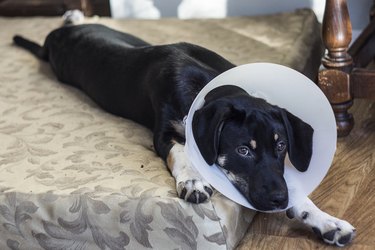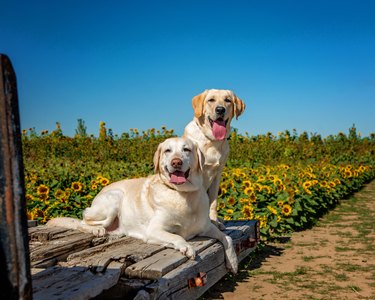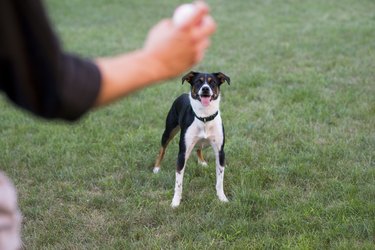How to Care for a Dog After Neutering Surgery
The first 24 hours after a neuter surgery are critical for your dog's safety and recovery. Your pooch may be a little disoriented from the general anesthesia. We got some useful information about how to care for a dog after neutering surgery from Dr. Ingrid Taylor, a veterinarian with 16 years of experience in general clinical and emergency practice and public health. She says that you'll need to monitor his food and water intake, separate him from other animals in the household, and put a special collar on him to limit his access to the incision site if needed. It's also important to keep an eye on his surgery site and give him his pain medication. If you suspect anything is out of the ordinary, call your veterinarian.

Video of the Day
Food and water after neuter surgery
Your dog shouldn't have anything to eat for two to four hours after he gets home. Between the lingering effects of general anesthesia and his recent car ride, he might be queasy. Give him small portions of food — "half his normal amount the evening after he gets home from surgery," says Dr. Taylor.
Video of the Day
He might not want to eat or drink, and that's normal. As long as he seems to tolerate everything and not throw up his food, you should be able to resume his normal feeding schedule the next day. If he shows no interest in his food, remove it and try to offer him some later, Dr. Taylor suggests, but do make sure he has access to plenty of water.
If he does vomit, take away his food and leave him with water or ice cubes until his stomach settles. "If he vomits or his appetite does not return in the 12-24 hours following surgery, call your veterinarian," Dr. Taylor says. "He may be a bit subdued or tired in the day or two following surgery, but if he's lethargic, unwilling to move, or is showing any abnormal behavior call your veterinarian."

Keep your male dog secluded from other pets
"Keep your pup away from all other animals, even cats and small pets," says Dr. Taylor. Dogs smell strange and may act different after neuter surgery. The unfamiliarity can cause a fight, especially if your newly neutered pal feels nervous or uneasy. Plus, you don't want other animals to lick his incision site, which could prolong the healing process. Create a safe-healing haven for your pooch in a bedroom or spacious kennel. He'll need his own bed, toys, and food and water dishes.
You need to restrict his activity for at least a week, meaning if the rest of your furry bunch are full of energy, it's probably best to keep him secluded. "Running, jumping, and any other vigorous activity can cause complications at the surgery site, like swelling, bruising, and incisions that tear open," Dr. Taylor says. "The quieter you can keep him, the better he will heal. Activity should be restricted to short leash walks to go to the bathroom only.
Use e-collar after dog neutering
Odds are that your veterinarian sent your dog home with an Elizabethan collar, also called an "e-collar." This lampshade-looking device prevents your dog from nipping or licking his incision site. "Nipping or licking his surgery site can damage the incision, loosen stitches, cause swelling or infection, and possibly cause the incision to open," Dr. Taylor says.
It's important for pet owners to use the collar for at least a week after a dog spay or neuter. Your buddy can sleep in it and even eat and drink while it's on. However, because it's a little hard to get used to that first day couple of days post-op, your pooch might be reluctant to dine and drink. Take it off for short periods if this is the case. Make sure you're there to watch him and put it back on as soon as he's finished.

Other points of neuter aftercare for dogs
Keep an eye on the incision site. "You may see a bit of fresh blood around the incision in the first 24 hours, and bruising around the surgical site may become more prominent in that time," Dr. Taylor says. "This is typical and completely normal, but if you see drainage, increased swelling, or more than just a bit of blood in the incision area, call your veterinarian."
Give your pet any pain medications as prescribed. You can slip pills into soft, smelly treats or a spoonful of wet food to get your pup to take the meds.
The bottom line
Spay/neuter procedures are among the most common surgical procedures in all of veterinary medicine. Caring for a dog after neutering might seem stressful, but it's important to remember that you are doing what is best for them. Neuter surgery is a routine veterinary procedure, and most pups recover completely with no complications. Keeping your dog comfortable, calm, and isolated from other pets will speed up the healing process. Also, give him plenty of water and about half his usual amount of food on the first day post-op to avoid tummy trouble. Make sure he is wearing an e-collar.
If you notice any signs of infection or unusual side effects, such as drainage, bleeding, or excessive swelling at the surgical site, contact the animal hospital that did the procedure.